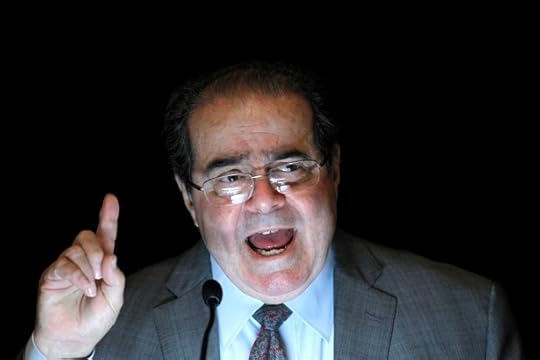Scalegalese: The Distinct Vocabulary of Antonin Scalia

“Words have meaning,” Antonin Scalia insisted in 2013. “And their meaning doesn’t change.”
That notion is something most linguists and lexicographers will, at minimum, quibble with. It is also, however, a foundation of Scalia’s originalist approach to Constitutional interpretation. “I mean, the notion that the Constitution should simply, by decree of the Court, mean something that it didn’t mean when the people voted for it,” the associate Supreme Court justice explained to New York magazine’s Jennifer Senior—“frankly, you should ask the other side of the question! How did they ever get there?”
How indeed. Scalia is someone who loves words—not just as sources of literary performance (alliteration! puns! Kulturkampf! argle-bargle!), but also as sources of semantic stability. Words, Scalia believes, root us, collectively and epistemologically. So his famously saucy approach to language isn’t just about bringing literature to legalese, or about the schadenfreudic delights of sending reporters scrambling to dictionaries and thesauri when he issues a scathing dissent. It’s also a philosophical declaration about the unchanging nature of old truths, whatever document may enshrine them. As the speechwriter Jeff Shesol wrote in the New Yorker last year, “His approach has always been to reach for a dictionary; find, in one edition or other, a definition that drives toward his predetermined decision; and express, eyes wide with disbelief, utter amazement that anyone could even think of seeing it any other way.”
Related Story
The Twilight of Antonin Scalia
As a result, Scalia has cited, in his opinions, not just the Random House College Dictionary, but also Noah Webster’s American Dictionary of the English Language (publication date: 1828), Samuel Johnson’s Dictionary of the English Language (1773), and Timothy Cunningham’s A New and Complete Law Dictionary (1771). Because words have meaning. And their meaning doesn’t change.
It was itself meaningful, then, that in his dissent on Thursday in King v. Burwell, arguing against the Court’s latest upholding of Obamacare, Scalia concluded: “Words no longer have meaning if an Exchange that is not established by a State is ‘established by the State.’”
It was also meaningful that he added, of the majority decision:
“The Court’s next bit of interpretive jiggery-pokery involves other parts of the Act that purportedly presuppose the availability of tax credits on both federal and state Exchanges.”
And also that he called the Court’s upholding of Obamacare the result of “somersaults of statutory interpretation.”
And also that he concluded: “We should start calling this law SCOTUScare.”
On the one hand, of course, this is just Scalia being Scalia (and the rest of us being Scalia’ed). Jiggery-pokery! In one of his earliest dissents, in 1987’s Johnson v. Transportation Agency, Scalia quoted that linguistic ur-innovator: Shakespeare. Citing an exchange from Henry IV, the new associate justice invoked “spirits from the vasty deep.”
In Romer v. Evans, a 1996 case on LGBT discrimination, he declared that “the Court has mistaken a Kulturkampf for a fit of spite,” referring to “the German policies designed to reduce the role and power of the Roman Catholic Church in Prussia, enacted from 1871 to 1878 by the Prime Minister of Prussia, Otto von Bismarck.”
In PGA Tour v. Casey Martin, a 2001 case addressing the Americans with Disabilities Act’s place in professional sports, he referred to the notion of “Platonic golf.”
In 2009, he debated a presenting lawyer about the ontology of the word “choate.” (“There is no such adjective,” Scalia insisted. “I know we have used it, but there is no such adjective as ‘choate.’ There is ‘inchoate,’ but the opposite of ‘inchoate’ is not ‘choate.’”)
In his dissent in 2013’s Maryland v. King, a case that revolved around the constitutionality of taking DNA samples from arrest suspects, Scalia warned of the dangers of creating a “genetic panopticon.”
Words, in the Court, are proxies for Constitutional interpretation: either living, breathing, contextual things, or inscribed to their original coinage.In his dissent against the striking down of the Defense of Marriage Act, Scalia famously categorized the majority opinion in the case as “legalistic argle-bargle.” (The term itself, its argliness and bargliness to the contrary, is not argle-bargle: It means, the lexicographer Ben Zimmer pointed out, “a description of ‘a verbal dispute’ or ‘a wrangling argument.’”)
And in that 2013 interview with New York magazine, Scalia used the word “ukase”—as in, the decision to strike down DOMA was “not at the ukase of a Supreme Court.”
His interviewer, Jennifer Senior—summoning the reaction most Americans would have to this creative diction—replied, simply: “What?”
“U-K-A-S-E,” Scalia answered, spelling it out. “Yeah. I think that’s how you say it. It’s a mandate. A decree.”
The Justice, the National Constitution Center notes, was correct. Merriam-Webster defines “ukase” as “a proclamation by a Russian emperor or government having the force of law.”
All of which—words have meaning. And their meaning doesn’t change—is classic Scalia. It’s words interpreted not just as conduits of meaning, but as solidifiers of it.
In The Second Amendment: A Biography, Michael Waldman notes that Scalia “has the feel of an ambitious Scrabble player trying too hard to prove that a triple word score really does exist.” But the stakes in his game, argle-bargle and jiggery-pokery notwithstanding, are high. Words, in the Court, are—or, at least, they can be—proxies for Constitutional interpretation. Justices can see them either as living, breathing, contextual things, or as things that are inscribed to their original coinage. There cannot, Scalia insists, be two sides to this argument. Elena Kagan, in a back-and-forth opinion-battle with Scalia last year, declared that “we must (as usual) interpret the relevant words not in a vacuum,” but instead with regard to their “structure, history, and purpose.” A notion to which, in a flourish fitting of his great philosophical frustration, Scalia has now replied: “Pure applesauce.”









Atlantic Monthly Contributors's Blog
- Atlantic Monthly Contributors's profile
- 1 follower



